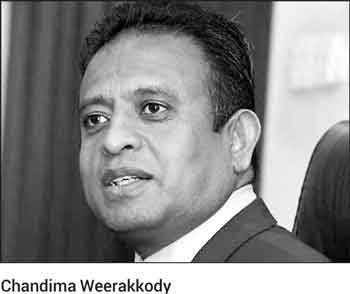Tuesday Feb 17, 2026
Tuesday Feb 17, 2026
Saturday, 25 May 2019 00:01 - - {{hitsCtrl.values.hits}}
 Sri Lanka abstaining to vote at the United Nations on Wednesday (22 May) to pass a non-binding resolution urging Britain to withdraw its colonial administration from the Chagos Islands, which is part of Mauritius, was questioned yesterday in Parliament.
Sri Lanka abstaining to vote at the United Nations on Wednesday (22 May) to pass a non-binding resolution urging Britain to withdraw its colonial administration from the Chagos Islands, which is part of Mauritius, was questioned yesterday in Parliament.
United Peoples’ Freedom Alliance (UPFA) lawmaker Chandima Weerakkody, highlighting the State policy to reject colonialism and the active role played in non-aligned movement, demanded to know the reasons for being silent when the resolution was taken up in the presence of 193 UN member countries.
“Sri Lanka does not support colonialism. This is not good for the future of Sri Lanka as well. The Government should clarify this in Parliament,” said MP Weerakkody.
In the absence of the Foreign Minister in Parliament, Speaker Karu Jayasuriya agreed to bring it to the Government’s attention.
The non-binding resolution influenced Britain to withdraw its colonial administration from the Chagos Islands within the next six months, and was moved by the African countries, receiving 116 votes in favour while Britain and the United States of America, along with four other countries, have voted against. Sri Lanka, along with several other countries in the Indian Ocean and with 56 others, including Canada, France, and Germany, have abstained.According to reports, the Indian Ocean archipelago, Chagos Islands have been at the centre of a decades-long dispute over Britain’s decision to separate it from Mauritius in 1965 and set up a joint military base with the US on Diego Garcia, the largest of the islands. Britain evicted about 2,000 people from the archipelago in the 1960s and ‘70s to make way for a significant US military base on Diego Garcia, which played a key strategic role in the Cold War before being used as a staging ground for US bombing campaigns against Afghanistan and Iraq in the 2000s. The facility was used as a CIA interrogation centre after the 11 September 2001 attacks.
In February, the International Court of Justice handed Mauritius a victory when it said in a legal opinion that Britain had illegally split the islands and should give up control of the Chagos.
After Britain rejected that ruling, Mauritius turned to the UN General Assembly to press for action. Mauritius argues the Chagos archipelago was part of its territory since at least the 18th century and was taken unlawfully by the UK in 1965, three years before the island nation gained independence.
However, Britain insists it has sovereignty over the archipelago, which it calls ‘British Indian Ocean Territory’.(AH)